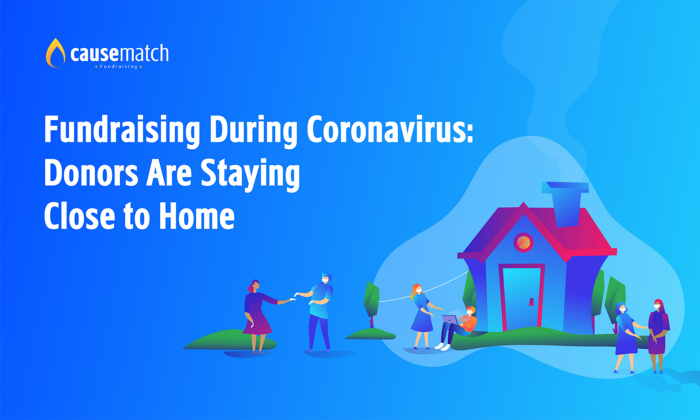Already, Coronavirus (COVID-19) is teaching fundraisers about raising money.
How do donors react when the economy is uncertain? As unemployment skyrockets? As the pandemic puts individuals’ physical and mental well-being through the wringer?
The financial effects will continue to linger for months and years. Still, nonprofits have to react at lightning speed. Fundraisers are throwing all different sorts of tactics and strategies against the wall. We’re beginning to see what sticks.
People are giving to their tribes
CauseMatch has analyzed the data from its current live campaigns. The average gift size is twice as large for city-specific organizations. National organizations aren’t eliciting the same size donations as local, city-based nonprofits.
Not only are city-specific organizations receiving larger donations, but they’re also seeing more donors, too. National organizations’ databases are generally bigger than local nonprofits’. Yet, these larger institutions aren’t seeing the great number of donors on whom they rely.
Many of the local fundraisers on the site are institutions of higher learning. Alumni and local residents are donating to the schools that have shaped their character.
Investments in relationships are paying off
Why are city-specific institutions outperforming larger, national campaigns?
We have a couple of reasonable hypotheses.
One: city-specific institutions can lean more heavily on the relationships that they had already formed before the pandemic.
Many donors worry about their own economic futures. If they are going to donate to a cause, they are going to donate to someone they trust. On a personal level.
Now is a time of crisis for many individuals and families. Donors are opening up their hearts and wallets for the specific fundraisers they care about.
Beyond donating to causes they are personally connected to, donors are also willing to be “team fundraisers” and take-on personal fundraising targets to help their favorite nonprofits.
Donors create micro-page as part of the wider organization’s fundraiser and then promote their personal pages to their own network. This approach of peer-to-peer fundraising allows nonprofits to effectively tap into the personal networks and relationships each donor possesses. Rather than the nonprofit asking the community to give, the campaign becomes about the community rallying together to support a cause they all are connected to and care about.
We may be past the age where charities can rely on donations simply because they do good work. Coronavirus has taught us that fundraisers must invest in their relationships with donors when times are good…so they can ask for donations even when times are bad.
A little vulnerability goes a long way
Two, organizations often make the dreaded mistake of asking people to give money… as opposed to asking people to solve a problem.
Donors are much more likely to give when they feel like their money is being used to right a wrong in the world. They want to feel like heroes.
Unfortunately, coronavirus has presented an easy-to-understand problem for donors to solve. But not all organizations are “taking advantage” of this opportunity. Many campaigns we have seen are reluctant to paint their organization as needy. As a result, they don’t adequately put the donor in the position of the hero.
City-specific organizations seem to be finding an easier time in articulating the need. Maybe it’s because the people they are helping are people in the community that everyone knows. Maybe it’s because they are under greater threat of permanent closure. Maybe it’s because they are less protective of their brand.
Whatever the reason, they are doing a better job of giving donors a problem to solve.
(It is true that people want to be part of a winning team; no one wants to jump on a sinking ship. Organizations shouldn’t go too far when crying “woe is me.”
That said, there is an easy balance to walk. Show that:
a) there is a problem to solve,
b) donors can solve it, and
c) your organization is the right ‘middleman’ to connect the two)
Huge caveat: There is no replacement for emotional intelligence
During this tumultuous time, individuals and families are dealing with their own disruptions.
Between medical issues and unprecedented unemployment numbers… Between kids at home and seniors living in isolation… There are countless ways coronavirus has upended peoples’ lives. These people are your donors. Your donors’ lives are undoubtedly chaotic right now.
Fundraisers need to lead with compassion and empathy. They need to be acutely tone-aware (as opposed to tone-deaf) of the messages they are sending. Both in the form of mass communication and personal conversations.
Fundraisers need to have a higher emotional IQ now more than ever.
Don’t be afraid to ask for donations now. But do so knowing everyone is living under strained and uncertain conditions.
Summary
These insights can improve your GivingTuesdayNow campaign in transformative ways.
- Rely on the relationships you have cultivated over the years. In times of crises, you depend on those closest to you. Utilize your major donors, your board, the enthusiasts who love your cause. Think locally, and you’ll create a movement.
- Reach out to your donors and ask them to join you as a partner in the campaign by being a team fundraiser. Leveraging peer-to-peer fundraising is an especially important aspect of geography specific causes. Nonprofits can learn more about peer-to-peer strategies and best practice by downloading the CauseMatch Peer-To-Peer Strategy Guide here: https://causematch.activetrail.biz/Peer-to-peer-strategy-guide
- Give donors a specific problem to solve. Tell them what this pandemic has done to your service recipients. It’s OK to be vulnerable!
- Show empathy. Acknowledge that every individual and family is going through tumult. Ask if donors need their own help. Offer to refer them to the places that can provide support. Both in your written communication and your personal solicitations, you must reflect that you care about your donors’ well-being. They’ll respond in kind.
Happy fundraising! If you have any questions, please feel free to reach us at [email protected]

